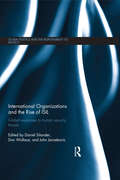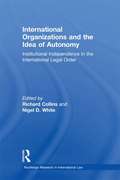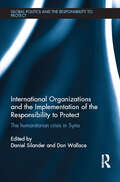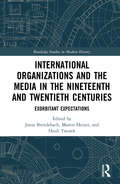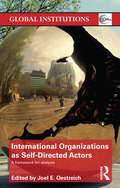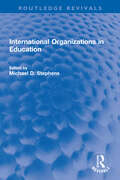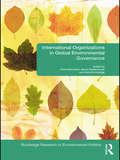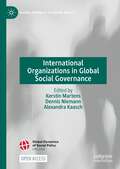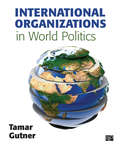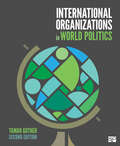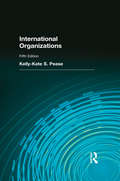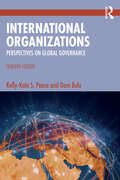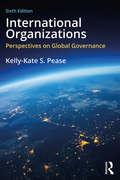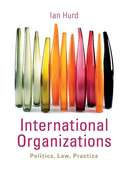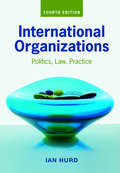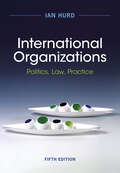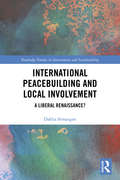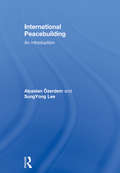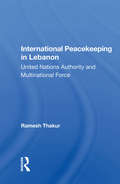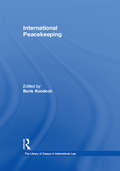- Table View
- List View
International Organizations and The Rise of ISIL: Global Responses to Human Security Threats (Global Politics and the Responsibility to Protect)
by Don Wallace Daniel Silander John JanzekovicThis book seeks to understand the obligations of the international community to promote and protect state and human security in situations of international humanitarian crises. In Iraq and Syria, as well as in neighbouring states, the rise of ISIL has raised serious state and human security challenges. This study explores the relationships between the Global-Regional Partnership, the United Nations and nine organizations in their attempt to deal with the challenges presented by ISIL. Each organization is analyzed in terms of how it has responded in the past and how it is now responding to the ISIL threat based on three perspectives; resource capacities (military, political, economic, technological, normative); willingness and readiness; and impediments to capacity and abilities. The overall aim is to discern what capacities and abilities international organizations have to protect state and human security and prevent civilians from mass atrocities inflicted by ISIL forces. The study addresses the role of international organizations when the UNSC is unable or unwilling to uphold the most fundamental norms and values in the UN Charter. This approach acknowledges that within the international community there is an overall acceptance on security for a partnership between the UN and regional organizations, but that there is also a contested call for a renegotiated international contract on state and human security. This volume will be of much interest to students of international relations, human rights, peace and conflict studies, terrorism studies and International Relations.
International Organizations and the Idea of Autonomy: Institutional Independence in the International Legal Order (Routledge Research in International Law)
by Nigel D. White Richard CollinsInternational Organizations and the Idea of Autonomy is an exploratory text looking at the idea of intergovernmental organizations as autonomous international actors. In the context of concerns over the accountability of powerful international actors exercising increasing levels of legal and political authority, in areas as diverse as education, health, financial markets and international security, the book comes at a crucial time. Including contributions from leading scholars in the fields of international law, politics and governance, it addresses themes of institutional autonomy in international law and governance from a range of theoretical and subject-specific contexts. The collection looks internally at aspects of the institutional law of international organizations and the workings of specific regimes and institutions, as well as externally at the proliferation of autonomous organizations in the international legal order as a whole. Although primarily a legal text, the book takes a broad, thematic and inter-disciplinary approach. In this respect, International Organizations and the Idea of Autonomy offers an excellent resource for both practitioners and students undertaking courses of advanced study in international law, the law of international organizations, global governance, as well as aspects of international relations and organization.
International Organizations and the Implementation of the Responsibility to Protect: The Humanitarian Crisis in Syria (Global Politics and the Responsibility to Protect)
by Daniel Silander and Don WallaceThis book seeks to understand the obligation of the international community to implement the principles of the Responsibility to Protect (R2P). With a focus on the humanitarian crisis in Syria, the volume examines what formal responsibility and actual capability international institutions have to protect and prevent civilians from systematic mass atrocities and presents an analysis of several prominent international organizations (IOs). Each chapter focuses on a specific organization and explores their formal responsibilities and how these pertain to the obligations of the R2P. Existing capabilities and actual abilities to address the challenges of R2P are analysed by looking at these issues before, during, and after the occurrence of the humanitarian crisis in Syria. With the UN not fully engaged in the Syrian conflict, the systematic human rights abuses have engendered greater attention on other organizations. This volume argues that if the UN Security Council’s inactions result in an abdication of responsibilities under the UN Charter, there should not only be a discussion of how the UN must alter its approach, but also an examination of whether there are alternative R2P paths for other MNOs to take in the name of international peace and human security. This book will be of much interest to students of R2P, humanitarian intervention, international organisations, Middle Eastern politics and security studies.
International Organizations and the Media in the Nineteenth and Twentieth Centuries: Exorbitant Expectations (Routledge Studies in Modern History)
by Jonas Brendebach Martin Herzer Heidi J.S. TworekInternational Organizations and the Media in the Nineteenth and Twentieth Centuries is the first volume to explore the historical relationship between international organizations and the media. Beginning in the early nineteenth century and coming up to the 1990s, the volume shows how people around the globe largely learned about international organizations and their activities through the media and images created by journalists, publicists, and filmmakers in texts, sound bites, and pictures. The book examines how interactions with the media are a formative component of international organizations. At the same time, it questions some of the basic assumptions about how media promoted or enabled international governance. Written by leading scholars in the field from Europe, North America, and Australasia, and including case studies from all regions of the world, it covers a wide range of issues from humanitarianism and environmentalism to Hollywood and debates about international information orders. Bringing together two burgeoning yet largely unconnected strands of research—the history of international organizations and international media histories—this book is essential reading for scholars of international history and those interested in the development and impact of media over time.
International Organizations as Orchestrators
by Duncan Snidal Kenneth W. Abbott Philipp Genschel Duncan Snidal Bernhard Zangl Kenneth W. Abbott Philipp GenschelInternational Organizations as Orchestrators reveals how IOs leverage their limited authority and resources to increase their effectiveness, power, and autonomy from states. By 'orchestrating' intermediaries - including NGOs - IOs can shape and steer global governance without engaging in hard, direct regulation. This volume is organized around a theoretical model that emphasizes voluntary collaboration and support. An outstanding group of scholars investigate the significance of orchestration across key issue areas, including trade, finance, environment and labor, and in leading organizations, including the GEF, G20, WTO, EU, Kimberley Process, UNEP and ILO. The empirical studies find that orchestration is pervasive. They broadly confirm the theoretical hypotheses while providing important new insights, especially that states often welcome IO orchestration as achieving governance without creating strong institutions. This volume changes our understanding of the relationships among IOs, nonstate actors and states in global governance, using a theoretical framework applicable to domestic governance.
International Organizations as Self-Directed Actors: A Framework for Analysis (Global Institutions)
by Joel E. OestreichThis exciting new text illustrates and advances the argument that International Organizations (IOs) need to be taken seriously as actors in world affairs. Bringing together an international line-up of distinguished contributors, the text examines recent theories that suggest how IOs are able to set their own policies and implement them in meaningful ways. The chapters review these theoretical positions and then present a series of case studies which focus on how these theories play out when IOs are charged with solving global problems: including development, peacekeeping and environmental policy coordination. Examining and analysing both positive and negative examples of this independence, this text is a valuable resource on the topic of the internal workings of IOs, providing the richest and most focused textbook so far dealing with the capacity of IOs for independent action in international politics. It is essential reading for all students of international organizations.
International Organizations in Education (Routledge Revivals)
by Michael D. StephensFirst published in 1988, International Organizations in Education is a collection of essays written to explore the various roles of international organizations in the field of adult education. The book highlights two distinct categories that emerged: organizations with a world-wide commitment, such as Unesco, ad those with a more regional basis, such as the African Association for Literacy and Adult Education. Each contributor examines the history and contemporary characteristics of the organization before going on to consider possible future directions. The achievements and role of such organizations are considered, and each author offers a depth of personal experience. International Organizations in Education offers a varied and wide-ranging view of the history of international organizations in the field of education and the role of those organizations at the time of original publication.
International Organizations in Global Environmental Governance (Environmental Politics)
by Bernd Siebenhüner Frank Biermann Anna SchreyöggThis book provides a comparative study of the role of international organizations in environmental governance. Whilst a growing body of literature considers global governance in a number of policy areas, this volume delivers one of the first comprehensive accounts of international organizations in relation to environmental policy. Providing the reader with key insights within this area of global governance, the book focuses on policies developing in relation to climate change, biodiversity and international environmental funding. Presenting a compelling and up-to-date account of developments within this burgeoning policy area, the volume: • includes a range of case studies including the World Bank, UNEP and the OECD • presents quantitative and qualitative research that advances understanding of international organizations in the field of international relations • delivers contributions from a range of internationally renowned academics and specialists within the field International Organizations in Global Environmental Governance will be of interest to students and scholars of international relations theory, international economics, environmental policy, organizational theory and environmental studies.
International Organizations in Global Social Governance (Global Dynamics of Social Policy)
by Kerstin Martens Alexandra Kaasch Dennis NiemannInternational Organizations (IOs) are important actors within global social governance. They provide forums for exchange, contention and cooperation about social policies. Our knowledge about the involvement of IOs varies significantly by policy fields, and we know comparatively little about the specific roles of IOs in social policies. This volume enhances and systematizes our understanding of IOs in global social governance. It provides studies on a variety of social policy fields in which different, but also the same, IOs operate. The chapters shed light on IO involvement in a particular social policy field by describing the population of participating IOs; exploring how a particular global social policy field is constituted as a whole, and which dominant IOs set the trends. The contributors also examine the discourse within, and between, these IOs on the respective social policies. As such, this first-of-its kind book contributes to research on social policy and international relations, both in terms of theoretical substantiation and empirical scope.
International Organizations in WTO Dispute Settlement
by Marina FolteaThis book analyses the role of international organisations in WTO dispute settlement as arising from a number of WTO disputes. In particular, the roles of the IMF, WIPO, WCO and WHO are addressed. The use of the Vienna Convention rules of interpretation framework allows an evaluation of the weight attributed to this material by the WTO adjudicator. This allows specific conclusions to be drawn regarding the level of institutional sensitivity of the WTO adjudicator to each of the organisations. As well as being a valuable source of research, the analysis will appeal to international law scholars, civil servants and law practitioners interested in the WTO and dispute settlement.
International Organizations in World Politics
by Tamar L. GutnerThis timely new title examines the importance and impact of major international organizations and their role in global governance. International Organizations in World Politics focuses on the most influential IOs, including the United Nations, World Bank, International Monetary Fund, and World Trade Organization. For each organization, author Tamar Gutner describes their birth and evolution, governance structure, activities, and performance. A second chapter on each organization presents a case study that illuminates the constraints and challenges each IO faces. Regional organizations and issues are also examined, including the European Union and the euro crisis, as well as a case study on the African Union’s peace operations.
International Organizations in World Politics
by Tamar L. GutnerThis timely new title examines the importance and impact of major international organizations and their role in global governance. International Organizations in World Politics focuses on the most influential IOs, including the United Nations, World Bank, International Monetary Fund, and World Trade Organization. For each organization, author Tamar Gutner describes their birth and evolution, governance structure, activities, and performance. A second chapter on each organization presents a case study that illuminates the constraints and challenges each IO faces. Regional organizations and issues are also examined, including the European Union and the euro crisis, as well as a case study on the African Union’s peace operations.
International Organizations in World Politics
by Tamar L. GutnerInternational organizations (IOs) are essential and controversial actors in global governance, working on just about every imaginable issue that states cannot easily address individually. The Second Edition of International Organizations in World Politics offers a comprehensive overview of major IOs and regional organizations and their role in global governance. Tamar Gutner presents a variety of theoretical approaches to analyzing the roles and impact of large IOs, including the United Nations, World Bank, International Monetary Fund, and World Trade Organization, and examines their historical development, governance structure, activities, and performance. For each IO, a detailed case study illuminates the constraints and challenges it faces in areas of contemporary global challenges like conflict resolution, development, the environment, trade, and financial crisis. The Second Edition includes updated coverage of IOs′ responses to major world issues like the COVID-19 pandemic, the war in Ukraine, and other geopolitical tensions.
International Organizations in World Politics
by Tamar L. GutnerInternational organizations (IOs) are essential and controversial actors in global governance, working on just about every imaginable issue that states cannot easily address individually. The Second Edition of International Organizations in World Politics offers a comprehensive overview of major IOs and regional organizations and their role in global governance. Tamar Gutner presents a variety of theoretical approaches to analyzing the roles and impact of large IOs, including the United Nations, World Bank, International Monetary Fund, and World Trade Organization, and examines their historical development, governance structure, activities, and performance. For each IO, a detailed case study illuminates the constraints and challenges it faces in areas of contemporary global challenges like conflict resolution, development, the environment, trade, and financial crisis. The Second Edition includes updated coverage of IOs′ responses to major world issues like the COVID-19 pandemic, the war in Ukraine, and other geopolitical tensions.
International Organizations: Pearson New International Edition CourseSmart eTextbook
by Kelly-Kate S. PeaseDrawing on mainstream and critical theoretical approaches, International Organizations offers a comprehensive examination of international organizations’ political and structural role in world politics. This text details the types and activities of international organizations and provides students with the conceptual tools needed to evaluate their effectiveness. Surveying key issue areas from international and human security to trade and the environment, International Organizations looks at present and future possibilities for global governance from a broad range of perspectives. New to the Fifth Edition The nexus between international law and international organizations is explored to show how they complement and influence each other. Each issue chapter highlights the relevant treaties, norms, and customs, and interprets the impact of international law on the politics of the issue. Not only does this book cover international and human security concerns but it now looks at the growing danger posed by the proliferation of weapons of mass destruction, with special emphasis on the spread of nuclear weapon technology. A new in-depth case study on Iran explores Iran’s quest for nuclear technology against the backdrop of its legal duties and obligations under Nuclear NonProliferation Treaty (NPT). The case also examines the role of the International Atomic Energy Agency (IAEA) in managing the use of nuclear technology and energy. An updated analysis of global climate change is provided to explain the political outcomes of the 2009 Copenhagen Conference. An exploration of international criminal law with special reference to the International Criminal Tribunal for the Former Yugoslavia (ICTY) and the International Criminal Court (ICC). Every chapter includes the most recent political events, scholarship, and data, especially as it relates to the impact of the global financial crisis on trade and development.
International Organizations: Perspectives on Global Governance
by Kelly-Kate S. Pease Dani BeloDrawing on mainstream and critical theoretical approaches, International Organizations offers a comprehensive examination of the role of international organizations in world politics. This text details the types and activities of international organizations and provides students with the conceptual tools needed to evaluate their effectiveness. Surveying key issue areas including security, trade, development, the environment and human rights, International Organizations looks at global governance from a broad range of perspectives.New to the Seventh Edition Inclusion of “narratives” to complement theoretical approaches to show how facts are used to frame reality and interpret world events. Narratives are used to advocate and build support for particular policies and strategies. Expanded analysis of International Security. New chapter on Global Public Heath with systematic treatment of the COVID-19 pandemic and the role of international organizations in identifying and managing the pandemic. New sections on global finance and international humanitarian law. Updated case studies on Iran and Ukraine. Discussion questions to help students reflect on each chapter’s content.
International Organizations: Perspectives on Global Governance (Mysearchlab Series 15% Off Ser.)
by Kelly-Kate S. PeaseDrawing on mainstream and critical theoretical approaches, International Organizations offers a comprehensive examination of international organizations’ political and structural role in world politics. This text details the types and activities of international organizations and provides students with the conceptual tools needed to evaluate their effectiveness. Surveying key issue areas from international and human security to trade and the environment, International Organizations looks at present and future possibilities for global governance from a broad range of perspectives. New to the Sixth Edition Focused on the seismic shifts caused by the rise of national populism and the effects on the more liberal institutions of global governance. Fully revised throughout with a feature on the EU in the face of Brexit, the Greek financial crisis, and global migration. Adds a new section on the Arab League, expanded coverage of NGOs, and updates on the Paris Climate Accords. Overhauls the chapter on International Security including expanded coverage of the UN’s present and historical role. Includes a new chapter on Regional Security covering NATO and ECOWAS. Provides new case studies on Syria, Ukraine, SDGs, and the global migration crisis, among several others.
International Organizations: Politics, Law, Practice
by Ian HurdThis textbook examines the world's most important international organizations, comparing their political environments, legal powers, and controversies. It examines 10 international organizations in detail: what they do, how and why they do it, and the problems they face.
International Organizations: Politics, Law, Practice
by Ian HurdAs international organizations become ever more prominent in global politics it is increasingly urgent to understand their power, their limits, and their effects. Now in its fourth edition, this leading textbook provides the definitive introduction to modern international organizations, from the legal charters of their beginnings, to the issues they engage with in the contemporary world. In his analysis of the United Nations, the World Trade Organization, the International Criminal Court and ten other prominent global institutions, Hurd combines legal, empirical, and theoretical approaches in an accessible and cohesive package. Fully revised and updated, this latest edition includes topical cases and controversies involving international organizations, such as Brexit, trade wars, environmentalism, forced migration and border disputes. It will be of interest to undergraduate and graduate students taking courses in international organizations, international institutions, global governance, and international law.
International Organizations: Politics, Law, Practice
by Ian HurdInternational organizations are increasingly important to global politics, law, and culture. Now in its fifth edition, this leading textbook provides the definitive introduction to modern international organizations by examining a dozen prominent global institutions. With a mix of legal, empirical, and theoretical approaches, the author examines timely cases where IOs are in the headlines today including on migration, Brexit, trade wars, and border disputes. This new edition is fully revised and updated, featuring new chapters on how global sports are organized by FIFA and the International Olympic Committee. The book explains the power and limits of international organizations by seeing how their legal authority interacts with politics in real-world controversies. It will be of interest to undergraduate and graduate students taking courses in international organizations, international institutions, global governance, and international law.
International Peacebuilding and Local Involvement: A Liberal Renaissance? (Routledge Studies in Intervention and Statebuilding)
by Dahlia SimanganThis book interrogates the common perception that liberal peace is in crisis and explores the question: can the local turn save liberal peacebuilding? Presenting a case for a liberal renaissance in peacebuilding, the work interrogates the assumptions behind the popular perception that liberal peace is in crisis. It re-examines three of the cases igniting the debate – Cambodia, Kosovo, and Timor-Leste – and evaluates how these transitional administrations implemented their liberal mandates and how local involvement affected the conduct of their activities. In so doing, it reveals that these cases were neither liberal nor peacebuilding. It also demonstrates that while local involvement is imperative to peacebuilding, illiberal local involvement restores an elite-centred status quo and reinforces or creates new forms of conflict and violence. Using both liberal and critical lenses, the author ultimately argues that the conceptual and operational departure from the holistic and comprehensive origins of liberal peacebuilding in fact paved the way for the liberal peace crisis itself. Drawing on analysis from in-depth field research and interviews, this book will be of much interest to students of peacebuilding, peacekeeping, statebuilding, security studies and International Relations in general.
International Peacebuilding: An introduction
by Alpaslan Ozerdem SungYong LeeInternational Peacebuilding offers a concise, practical and accessible introduction to the growing field of peacebuilding for students and practitioners. This new textbook comprises three parts, each dealing with a key aspect of peacebuilding: Part I defines the core concepts and theoretical discussions that provide the philosophical grounds for contemporary peacebuilding activities. Part II divides the procedures of peacebuilding into three phases and examines some of the important features of each phase. Part III examines the key areas of the practice of peacebuilding. The volume approaches peacebuilding from the viewpoints of individual actors or institutions, introducing a range of theoretical discussions with which students can critically examine contemporary peacebuilding practice, as well as presenting detailed case studies for key issues highlighted in the text. In doing so, the book aims to provide more concrete ideas on how peacebuilding programmes are planned and implemented in the field and which major issues should be addressed by peacebuilding practitioners. This book will be essential reading for all students of peacebuilding, conflict transformation and post-conflict reconstruction, and recommended reading for students of international organisations, international security and IR in general.
International Peacekeeping In Lebanon: United Nations Authority And Multinational Force
by Ramesh ThakurExamining the efficacy of U.N. peace efforts, Dr. Ramesh Thakur compares limited peacekeeping through U.N. authority with more coercive means such as the Multinational Force (MNF) in Lebanon. He finds that the role of the U.S.-led MNF coalition cannot be justified in terms of great-power responsibility for ensuring a stable international order, since the coalition has attempted to substitute military power for authoritative peacekeeping. When MNF legitimacy was questioned and authority was challenged, the MNF's use of force in response to those challenges switched the coalition's role from third-party peacekeeper to factional participant. As a result, every successive attempt to strengthen the MNF mandate has further subordinated the concept of neutral international peacekeeping to calculated support of national interests. If reasoned attempts to keep the peace are not to collapse into exercises in national self-interest, then peacekeeping responsibilities must remain with the U.N., supported by the great powers: Only the U.N. can provide an authoritative exposition of values within the context of international society and bestow international legitimacy upon peacekeeping activities; only the great powers can back the U.N. with requisite force.
International Peacekeeping: The Yearbook Of International Peace Operations (The Library of Essays in International Law #9)
by Boris KondochPeacekeeping has been the technique most frequently used by, and associated with, the United Nations to end conflicts and to preserve peace. In addition, international and regional organizations have also performed peacekeeping functions. Since the establishment of the first UN peacekeeping mission, UNEF I, in 1956, international lawyers have raised questions about the legal aspects of these operations. Traditionally, they analyzed the constitutional basis for peacekeeping and tried to allocate the authority under the UN Charter for peacekeeping among the Security Council, the General Assembly and the Secretary General. They discussed the use of force by peacekeepers, the applicability of international humanitarian law, as well as the responsibilities and liabilities of peacekeepers. Since the end of the cold war, peacekeeping operations have become more complex. In the first forty years, peacekeepers functioned mainly as buffer zones between warring parties and monitored cease-fires. Nowadays, they are increasingly engaged in internal rather than international conflicts and perform a multitude of tasks. Among others, they act as civilian administrators, oversee elections and monitor human rights. These changes have raised new legal problems. Which human rights obligations exist for peacekeepers? Do peacekeepers have to intervene if they witness war crimes and acts of genocide? How are they protected under international law? What is the legal framework of UN administrations like in Kosovo and East Timor? In order to enhance a better understanding of these legal issues arising from peacekeeping operations, a collection of articles written by the leading experts in the field have been compiled in the volume, International Peacekeeping.
International Pecking Orders
by Vincent PouliotIn any multilateral setting, some state representatives weigh much more heavily than others. Practitioners often refer to this form of diplomatic hierarchy as the 'international pecking order'. This book is a study of international hierarchy in practice, as it emerges out of the multilateral diplomatic process. Building on the social theories of Erving Goffman and Pierre Bourdieu, it argues that diplomacy produces inequality. Delving into the politics and inner dynamics of NATO and the UN as case studies, Vincent Pouliot shows that pecking orders are eminently complex social forms: contingent yet durable; constraining but also full of agency; operating at different levels, depending on issues; and defined in significant part locally, in and through the practice of multilateral diplomacy.
